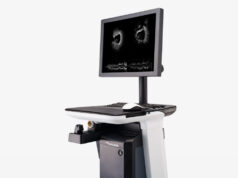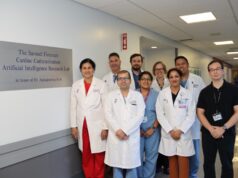The likelihood of patients with suspected or known coronary artery disease dying within 10 years, can be more accurately predicted using a novel artificial intelligence (AI) score, compared to established scores used by health professionals worldwide. This is according to the authors of research presented at EuroEcho 2021 (9–11 December, virtual).
Unlike traditional methods which are based on clinical data, the new score includes imaging information on the heart, measured by stress cardiovascular magnetic resonance (CMR). The study author, Theo Pezel of the Johns Hopkins Hospital, Baltimore, USA explained “This is the first study to show that machine learning with clinical parameters plus stress CMR can very accurately predict the risk of death,” he said.
Risk stratification is commonly used in patients at high risk of, cardiovascular disease to tailor management aimed at preventing heart attack, stroke, and cardiac death, however, conventional calculators only use a limited amount of clinical information such as age, sex, smoking status, blood pressure, and cholesterol, Pezel said. This study examined the accuracy of machine learning using stress CMR and clinical data to predict 10-year all-cause mortality in patients with suspected or known coronary artery disease and compared its performance to existing scores.
The study by Pezel et al, included 31,752 patients referred for stress CMR during the time period of 2008 and 2018 to a centre in Paris, and data was collected on 23 clinical and 11 CMR parameters These patients were referred due to chest pain, shortness of breath on exertion, or high risk of cardiovascular disease but were asymptomatic. In this study, a high-risk patient was defined as having at least two risk factors such as hypertension, diabetes, dyslipidemia, and current smoking habits. The average patient age was 64 years, consisting of 66% men. Patients were followed up for a median of six years for all-cause death, which was obtained from the national death registry in France. During the follow-up period, 2,679 (8.4%) patients died.
Machine learning was conducted in two steps. First, it was used to select which of the clinical and CMR parameters could predict death and which could not, and secondly, machine learning was used to build an algorithm based on the important parameters identified in step one, allocating different emphasis to each to create the best prediction. Patients were given a score of 0 (low risk) to 10 (high risk) for the likelihood of death within 10 years from this algorithm.
A prediction of which patients would survive through the machine learning presented 76% accuracy, which Pezel explained “This means that in approximately three out of four patients, the score made the correct prediction”.
Using the same data, the researchers calculated the 10-year risk of all-cause death using established scores (systematic coronary risk evaluation [SCORE], QRISK3, and Framingham Risk Score [FRS]) and a previously derived score incorporating clinical and CMR data (clinical-stress CMR [C-CMR-10])2—none of which used machine learning. The machine learning score had a significantly higher area under the curve for the prediction of 10-year all-cause mortality compared with the other scores: SCORE=0.66, QRISK3=0.64, FRS=0.63, and C-CMR-10=0.68.
To conclude, Pezel drew attention to the benefits and future advantages of CMR. “Stress CMR is a safe technique that does not use radiation. Our findings suggest that combining this imaging information with clinical data in an algorithm produced by AI might be a useful tool to help prevent cardiovascular disease and sudden cardiac death in patients with cardiovascular symptoms or risk factors.”










